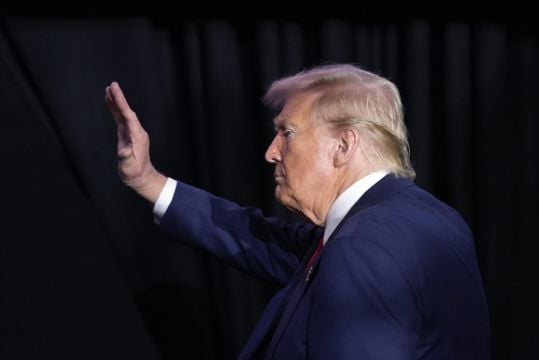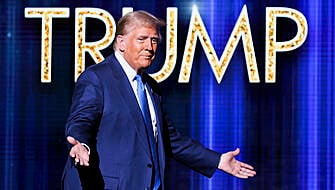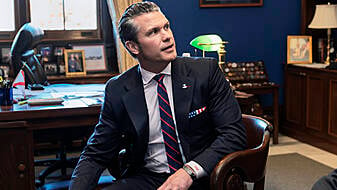Kamala Harris has said comments Donald Trump reportedly made to his longest-serving chief of staff demonstrate who the former president “really is” and the kind of commander in chief he would be.
In interviews with The New York Times and The Atlantic published on Tuesday, John Kelly warned that the Republican nominee meets the definition of a fascist and that while in office he suggested that Nazi leader Adolf Hitler “did some good things”.
Ms Harris repeated her increasingly dire warnings about Mr Trump’s mental fitness and his intentions for the presidency.

“This is a window into who Donald Trump really is, from the people who know him best, from the people who have worked with him side by side in the Oval Office and in the situation room,” she told reporters outside the vice president’s residence in Washington DC.
The comments from Mr Kelly, the retired marine general who worked for Mr Trump in the White House from 2017 to 2019, build on past warnings from former senior Trump officials as the election enters its final two weeks.
Mr Kelly has long been critical of Mr Trump and previously accused him of calling veterans killed in combat “suckers” and “losers”.
His new warnings emerged as Trump seeks a second term vowing to dramatically expand his use of the military at home and suggesting he would use force to go after Americans he considers “enemies from within.”
“He commented more than once that, ‘You know, Hitler did some good things, too’,” Mr Kelly recalled to the Times. He said he would usually quash the conversation by saying “nothing (Hitler) did, you could argue, was good”, but that Mr Trump would occasionally bring up the topic again.
In his interview with The Atlantic, Mr Kelly recalled that when Mr Trump raised the idea of needing “German generals”, Mr Kelly would ask if he meant “Bismarck’s generals”, referring to Otto von Bismarck, the chancellor who oversaw the unification of Germany.
“Surely you can’t mean Hitler’s generals,” Mr Kelly recalled asking, to which the former president responded: “Yeah, yeah, Hitler’s generals.”
Mr Trump’s campaign denied the accounts. Campaign spokesman Steven Cheung said Mr Kelly had “beclowned himself with these debunked stories he has fabricated”.
Ms Harris said on Wednesday that Mr Trump admired Hitler’s generals because he “does not want a military that is loyal to the United States Constitution, he wants a military that is loyal to him. He wants a military who will be loyal to him personally”.
Polls show the race is tight in swing states, and both Mr Trump and Ms Harris are criss-crossing the country making their final pitches to undecided voters.
Ms Harris’s campaign has spent considerable time targeting independent voters, using the support of long-time Republicans such as Liz Cheney and comments like Mr Kelly’s to urge past Trump voters to reject his candidacy in November.
Ms Harris’s campaign held a call with reporters on Tuesday to elevate the voices of retired military officials who highlighted how many of the officials who worked with Mr Trump now oppose his campaign.

“People that know him best are most opposed to him, his presidency,” said retired Army Brigadier General Steve Anderson.
Before serving as Mr Trump’s chief of staff, Mr Kelly worked as the former president’s secretary of homeland security, where he oversaw attempts to build a wall along the Mexico border.
Mr Kelly was also at the forefront of the Trump administration’s crackdown in immigration policy that led to the separation of thousands of immigrant parents and their children along the southern border. Those actions made him a villain to many on the left, including Ms Harris.
In his interview with the Times, Mr Kelly read the definition of a fascist aloud, including that fascism was “a far-right authoritarian, ultranationalist political ideology and movement characterised by a dictatorial leader”, and concluded that Mr Trump “certainly falls into the general definition of fascist, for sure”.
He added that Mr Trump often fumed at any attempt to constrain his power, and that “he would love to be” a dictator.
“He certainly prefers the dictator approach to government. I think he’d love to be just like he was in business — he could tell people to do things and they would do it, and not really bother too much about whether what the legalities were and whatnot.”







